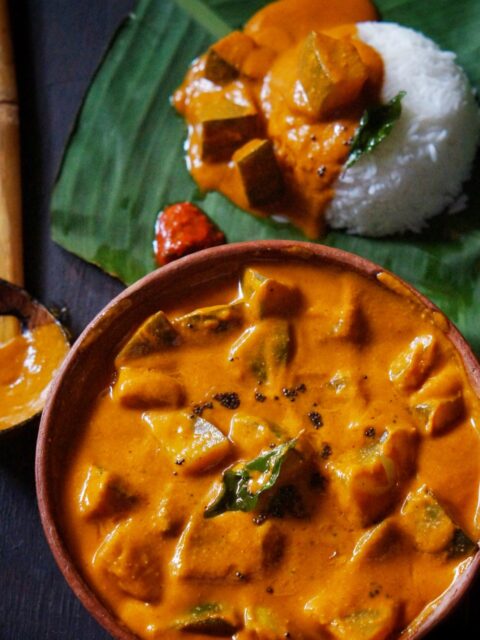Puli Kodhel, a temple-style Mangalorean curry that excludes onions and garlic, is a festive favourite. Puli Kodhel can be prepared using a variety of vegetables, but the common choice is Thauthe, also known as Mangalore Cucumber.
The key to a great Kodhel lies in properly roasting the masala ingredients. Til, Chana and Urad dals not only imbue the curry with a robust flavour but also thicken it to create a glossy, delicious dish. Topping it off with a coconut oil tadka fills the entire home with the tantalising aroma typical of festive lunches.
This recipe holds a special place in my heart. I remember preparing it for the leaf lunch during Krishna Janmashtami in 2014. Upon tasting the dish, my uncle, my mother’s brother, was moved to tears. He smiled and remarked that it tasted just like our maternal grandmother’s Kodhel. His comment had a profound effect on me, especially since it was the same year I had begun documenting my mother and grandmother’s recipes. The timing of his words provided the encouragement I needed to believe in the importance of preserving my family’s culinary heritage.

Puli Kodhel
Ingredients
- Thauthe (Mangalore Cucumber): 200 – 250 gms with skin
- Grated Coconut: 2-3 tbsp
- Jaggery: ¼ cup
- Tamarind: Lime size
- Byadagi Chillies: 6 to 8
- Sesame Seeds: ½ tsp
- Chana Dal: ½ tsp
- Urad Dal: 1 tsp
- Whole Dhania (Coriander): 1 tbsp
- Whole Jeera (Cumin): ½ tsp
- Turmeric: ½ tsp
- Salt, as per taste
For the Tadka:
- Coconut Oil: 1 tbsp
- Mustard Seeds: 1 tsp
- Curry leaves: A sprig
Method:
- Deseed and cut the Mangalore Cucumber into chunks, leaving the skin on.
- Boil it with salt to taste until tender.
- Dry roast the chillies, whole coriander, cumin, urad dal, chana dal, and sesame seeds.
- Add the grated coconut and turmeric to the pan and continue roasting until the coconut starts to brown slightly.
- Allow the roasted ingredients to cool down, then grind them together with the tamarind and jaggery to form a smooth paste.
- Add this ground paste to the cooked Mangalore Cucumber and bring it to a boil.
- Meanwhile, prepare the tadka. Heat the coconut oil and add the mustard seeds. Once they start to sputter, add the curry leaves. Pour this tadka over the boiling Kodhel and turn off the flame.
- Serve hot with rice, papad, and pickle. Enjoy your Thauthe Puli Kodhel!
Watch this recipe here – Puli Kodhel

Parinita Salian Crasta is a true Mumbaikar with a Mangalorean heart. Her childhood was divided between the bustling streets of Mumbai and the tranquil serenity of her maternal grandparents’ home in Bejai, Mangalore. Every school vacation was an escape to this ancestral home, where Parinita could shed her shyness and embrace the freedom of her Mangalorean roots.
In this quintessential Mangalorean home, Parinita found herself becoming a keen observer. She would quietly watch from the courtyard as guests conversed with her grandfather on the porch, often over tender coconuts and Dwarf Bananas or tea and almond milk with Biscuit Rotti or Goli Bajes.
But her real fascination lay in the kitchen, where her Amma (grandmother), Krishnabai Bangera, created culinary magic. Known across their extended family and neighbourhood for her delectable home cooking, Krishnabai’s dishes were renowned. The simplest of her saar, gassis, and kajipus tasted heavenly under her magical touch, or ‘Amma na kai’.
Parinita’s journey into the culinary world began under the guidance of her mother, Nishi Salian. Her mother, preserving and preparing many of Krishnabai’s recipes, has been her primary source of culinary education. These heirloom recipes, the priceless treasures passed down, became the foundation of Parinita’s culinary adventures.
Over time, Parinita has come to understand that it isn’t merely the recipes, but also the processes that matter. From using the warmth of one’s hand to aid the fermentation of batters to gently shaking the fish curry to avoid breaking the delicate pieces, she realised that these nuances of cooking come from careful observation rather than from a written recipe.
Outside the kitchen, Parinita delves into the world of Digital Marketing and Ad Sales. Currently, she resides in Edmonton, Canada, still cherishing her Mumbaikar spirit and nurturing her Mangalorean heart through her culinary explorations.
Translations and detailed descriptions are provided to give a better understanding of the story to people from different cultural backgrounds across the globe.

